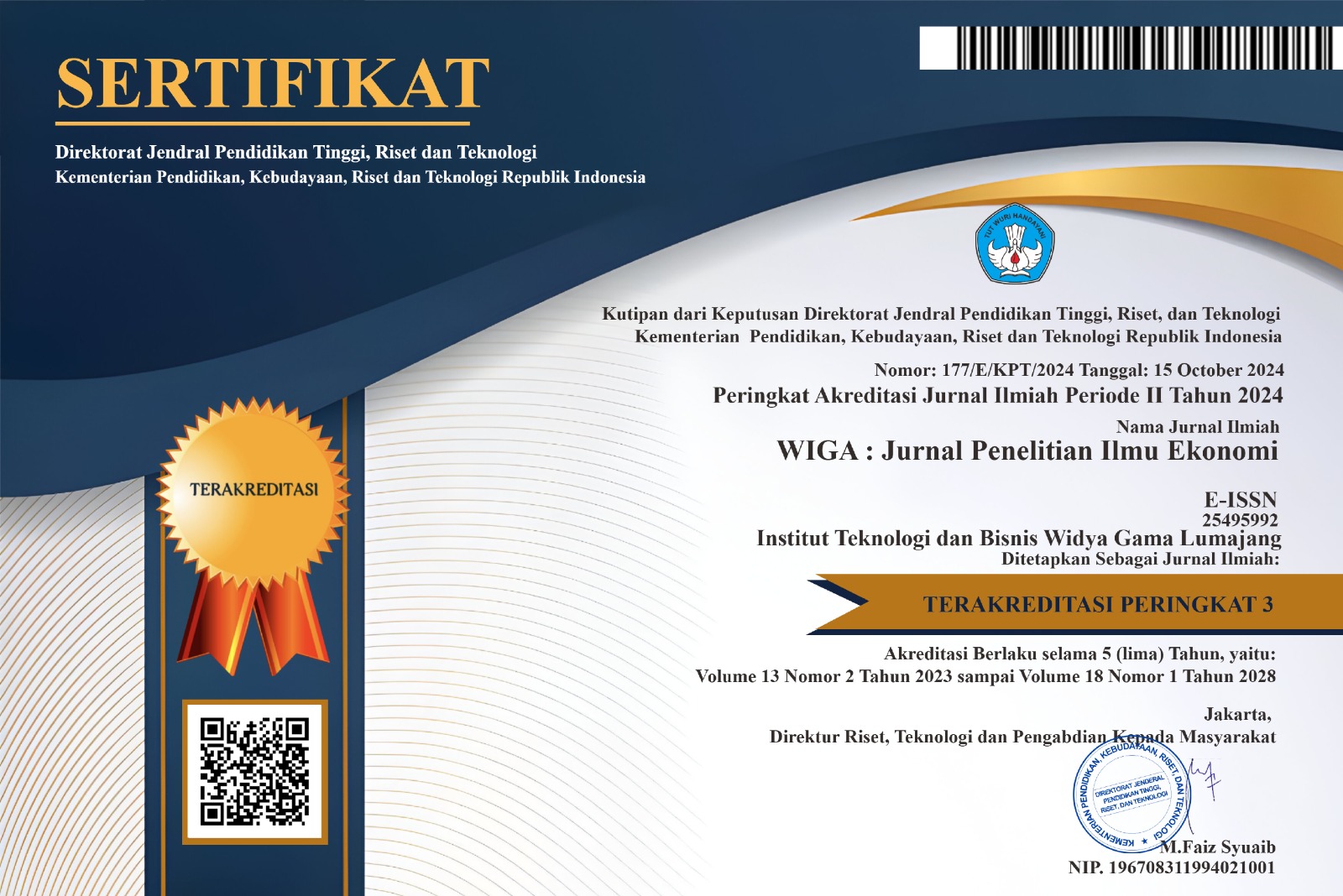The Importance of Work Stress and K3 (Occupational Health and Safety) in Assessing Employee Performance
DOI:
https://doi.org/10.30741/wiga.v11i1.607Abstract
It is very important to pay attention to factors that can affect employee performance, such as work stress experienced by employees or occupational safety and health. This research was conducted at PT. Akas Mila Sejahtera Probolinggo with the objectives (1) To determine the simultaneous effect of work stress and K3 (Occupational Health and Safety) on employee performance. (2) To determine the partial effect of work stress and K3 (Occupational Health and Safety) on employee performance. (3) To determine the dominant influence between work stress and K3 (Occupational Health and Safety) on employee performance. The population of this research is the employees of PT. Akas Mila Sejahtera City of Probolinggo, amounting to 90 people. The sample taken by the Slovin method is as many as 73 people, with the criteria of employees who work as drivers, kondiktur, kernet and workshops with incidental data collection techniques. The approach used is quantitative with analysis using SPSS software. The results showed that work stress and K3 (Occupational Health and Safety) had a significant effect on employee performance.
Downloads
References
Afandi, P. (2018). Manajemen Sumber Daya Manusia Teori, Konsep dan Indikator. Pekanbaru Riau: Zanafa Publishing.
Arikunto, S. (2013). Prosedur Penelitian Suatu Pendekatan Praktik. Jakarta: PT. Rineka Cipta.
Bhastary, M. D., & Suwardi, K. (2018). Analisis Pengaruh Keselamatan dan Kesehatan kerja (K3) dan Lingkungan kerja terhadap Kinerja Karyawan di PT. Samudera Perdana. Jurnal Manajemen dan Keuangan, 7(1).
Budiarto. (2017). Key Performance Indicator (KPI). Depok: Huta Publisher.
Hamali, A. Y. (2016). Pemahaman Manajemen Sumber Daya Manusia Strategi Mengelola Karyawan. Yogyakarta: PT. Buku Seru.
Mangkunegara, A. P. (2015). Manajemen Sumber Daya Manusia Perusahaan. Bandung: PT. Remaja Rosdakarya.
Mangkunegara, A. P. (2017). Evaluasi Kinerja SDM. Bandung: PT. Revika Aditama.
Marwansyah. (2012). Manajemen Sumber Daya Manusia. Bandung: Alfabeta.
Nugroho, Y. A. (2011). Olah Data dengan SPSS. Yogyakarta: PT. Skripta Media Creative.
Oemar, U., & Gangga, L. (2017). Pengaruh Stres Kerja terhadap Kinerja Pegawai pada Dinas Pendapatan, Keuangan dan Aset Daerah Kabupaten Musi Manyuasin. Jurnal Ecoment Global, 2(2): 22-34.
Riniwati, H. (2016). Manajemen Sumber Daya Manusia. Malang: UB Press.
Sedarmayanti. 2018. Perencanaan dan Pengembangan SDM untuk Meningkatkan Kompetensi, Kinerja dan Produktivitas Kerja. Bandung : PT. Refika Aditama
Sugiyono. (2016). Metode Penelitian Kuantitatif, Kualitatif dan R&D. Bandung: Alfabeta.
Sujarweni, W. (2015). Metodologi Penelitian Bisnis & Ekonomi. Yogyakarta: PT. Pustaka Baru.
Sunaryanto, K. (2015). Pengaruh keselamatan dan Kesehatan Kerja (K3) serta Stres Kerja terhadap Kinerja Karyawan. Jurnal Ilmu Manajemen, 2(3).
Sunyoto, D. (2011). Metodologi Penelitian untuk Ekonomi. Yogyakarta: CAPS.
Suryani & Hendryadi. (2016). Metode Riset Kuantitatif Teori dan Aplikasi pada Penelitian Bidang Manajemen dan ekonomi Islam. Jakarta: Kencana.
Sutrisno, E. (2017). Manajemen Sumber Daya Manusia. Jakarta: Kencana.
Wibowo. (2016). Manajemen Kinerja. Jakarta: PT. Raja Grafindo Persada.
Downloads
Published
How to Cite
Issue
Section
License
Copyright (c) 2021 Indah Nihayati, Moh. Saiful Bahri, Agustina Pujiastuti, Agung Yatiningrum

This work is licensed under a Creative Commons Attribution-ShareAlike 4.0 International License.










